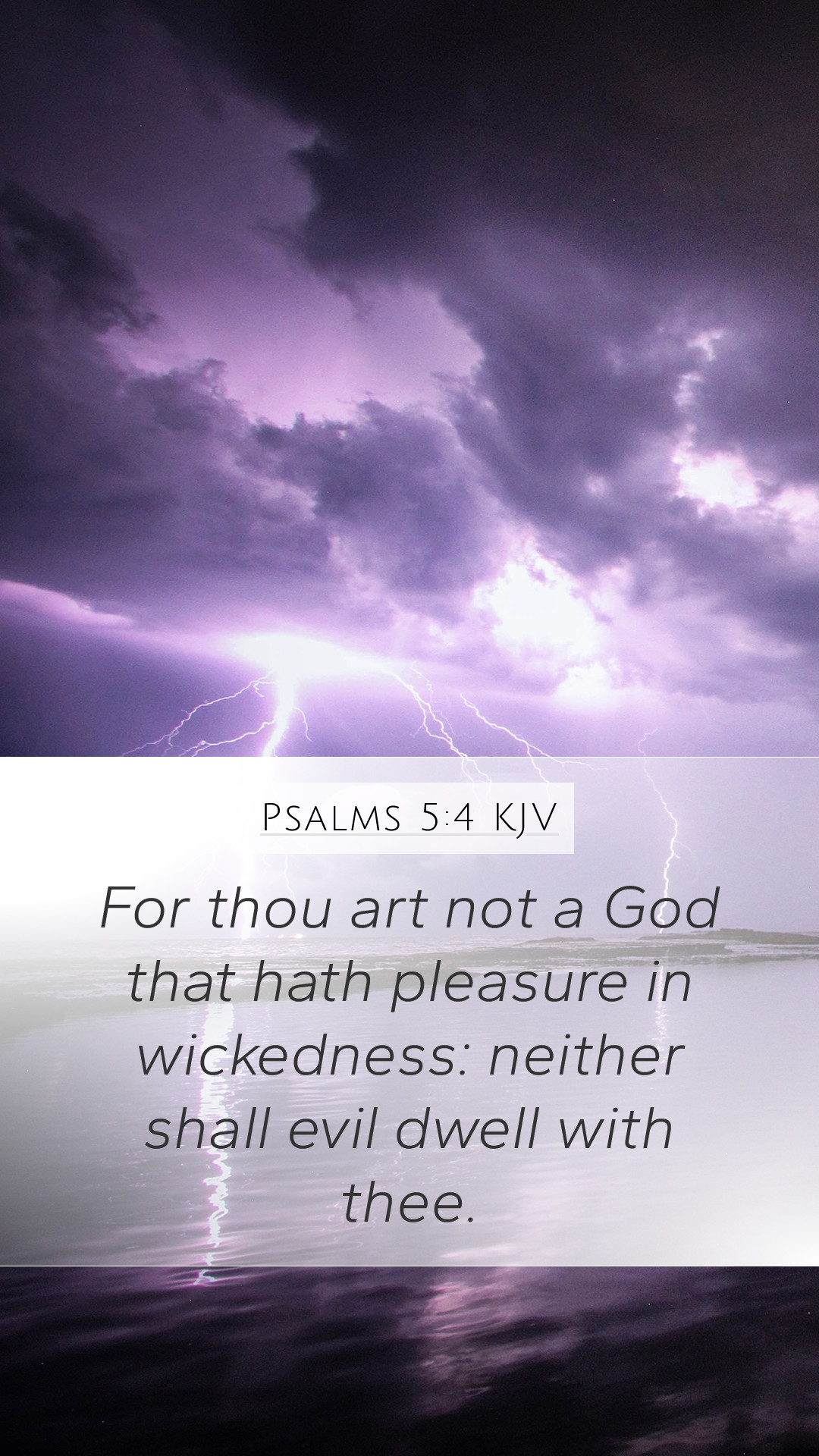Understanding Psalms 5:4
Psalms 5:4 states:
"For thou art not a God that hath pleasure in wickedness: neither shall evil dwell with thee."
This verse presents a profound insight into God's character, particularly His relationship with righteousness and evil.
Overview of Bible Verse Meanings
In this verse, the Psalmist emphasizes two primary attributes of God:
- Holiness: God's very nature is opposed to sin.
- Justice: God cannot tolerate evil or wrongdoing.
Bible Verse Interpretations
The interpretations provided by various public domain commentaries shed light on the depth of this scripture:
Commentary Insights
- Matthew Henry:
Henry points out that this verse serves as a reminder of the essential nature of God. He notes that as a righteous being, God finds no delight in wickedness, indicating that a relationship with Him cannot exist if one is entrenched in sin.
- Albert Barnes:
Barnes elaborates on the implications of God’s discontent with wickedness, suggesting that true worship requires aligning with His nature. He stresses that this verse reflects the fundamental truth that God abhors iniquity and establishes a standard for human morality.
- Adam Clarke:
Clarke emphasizes the eternality of God's standards. He argues that the statement underscores God's unchanging disposition toward sin, conveying that evil cannot coexist with Him. He also relates this idea to the hope for the righteous, who live in accordance with God's will.
Scripture Analysis
In-depth analysis of this verse reveals several crucial themes:
- The Nature of God: This verse highlights God's righteousness and justice, serving as a foundation for understanding His actions in the world.
- Sin and Division: It indicates that sin creates a separation between humanity and God, suggesting that repentance is necessary for fellowship.
- Call to Righteousness: The verse serves as an admonition for the faithful to remain steadfast in righteousness, reminding them of God's expectations.
Biblical Exegesis
The exegesis of Psalms 5:4 aids in understanding its theological implications:
This verse should be seen within the context of the entire Psalm, which is a petition for God’s guidance and protection against adversaries. It acts as a declaration of the Psalmist's trust in God's judgment:
- Contextual Meaning: By recognizing God’s absolute holiness, the Psalmist is establishing a basis for his appeal for justice.
- Historical Context: Understanding the socio-political troubles affecting the Israelites at the time provides deeper insight into why this affirmation of God’s nature is so vital.
Application of Bible Verses to Daily Life
Applying this verse to everyday life can offer significant spiritual insights:
- Personal Reflection: Individuals are encouraged to reflect on their lives and confront areas of sin, seeking to align with God’s righteousness.
- Moral Integrity: Believers are prompted to uphold ethical standards in daily interactions, knowing that God’s presence demands purity.
- Community Standards: Churches and Christian groups should advocate for holiness and justice as a reflection of God’s character.
Cross References
This verse can be cross-referenced with the following scriptures for further study and understanding:
- Habakkuk 1:13: Discusses God's inability to look upon sin.
- 1 John 1:5: Affirms that God is light and contains no darkness at all.
- Psalm 11:5: States that the Lord tests the righteous but His soul hates the wicked and the one who loves violence.
Conclusion
In summary, Psalms 5:4 serves as a powerful reminder of God's justice and holiness, urging believers to seek righteousness in their lives.
Understanding Scripture, especially in regard to God's nature, leads to a more profound appreciation of His grace and the cost of sin. This knowledge encourages deeper engagement in Bible study groups, enriching personal and communal faith journeys.


